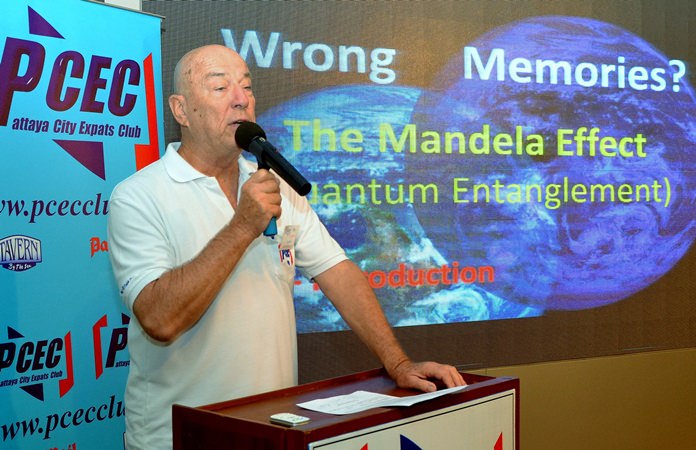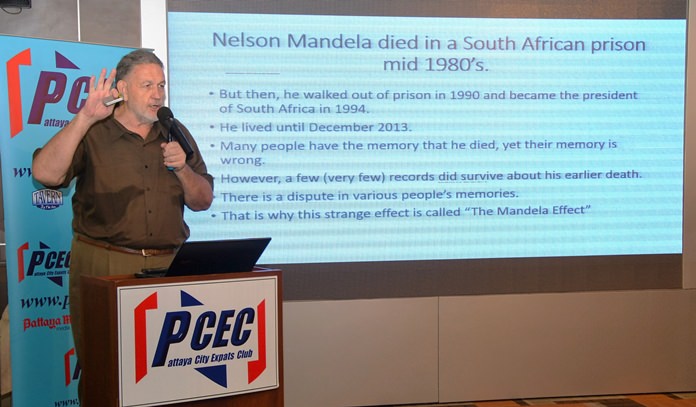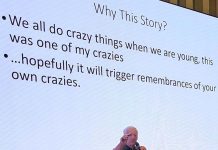Is it faulty memory or an unusual phenomenon? Corrie Lamprecht considers the belief that something happened, by many people, is a phenomenon; not faulty memory. This was his premise when he spoke to the Pattaya City Expats Club (PCEC) on Sunday, October 2.

He began by noting that many people remember that Nelson Mandela died in a South African prison in the mid-1980s. Except that he didn’t. He walked out of prison in 1990, became president of South Africa in 1994, and lived until 2013. As for the people who recall that he died in the mid-1980s, their memory is simply wrong. Corrie referred to this phenomenon as “the Mandela effect” and says that it is pretty widespread.

Corrie said that he remembers that the evangelist and pastor Bill Graham died in 1994 from Alzheimer’s disease and brain problems. He remembers the mass media coverage, the tributes paid by his wife and son, even a coffin draped with a white sheet with either a golden eagle or a white dove on top. Corrie remembers that his mother was devastated. But Billy Graham is still alive and preaching (per Wikipedia, he is still living and retired in 1986 at the age of 86). “My memory was wrong,” Corrie said.
In a sense, Corrie said, there is no right or wrong: What your memory tells you is your own personal reality. The Mandela Effect tends to affect older people more than it does younger people, Corrie explained.
To further support his opinion, he used some pictures showing two versions of some well-known graphics; comparing them for the audience and asking which is correct. He began by showing the Bugs Bunny for the cartoon show “Looney Toons” or was it “Looney Tunes.” If you asked ten people whether they remember, Corrie said, chances are more than two-thirds of them would say “Looney Toons.” They would be wrong. It has always been “Looney Tunes.” But people still argue about this. The same phenomenon arises with the logo for the Ford Motor company. Today, the logo has a loop in the “F.” But was it always so? Answer: The loop has been there since 1911. But people still argue about what they remember. What about the chocolate bar? Is it Kit-Kat (with a hyphen) or KitKat? Corrie said that in one survey, seven out of ten people said that as they remembered it, the logo had a hyphen. The truth? The logo has never had a hyphen.

Corrie mentioned that currently there are more than 11,000 Mandela Effects listed worldwide and that the number is growing daily. What causes the Mandela Effect? Corrie says that nobody knows. We only know that it is a real phenomenon.

[Wikipedia says that the term “Mandela Effect” was coined by paranormal enthusiast Fiona Broome, who says she remembers Nelson Mandela dying in the 1980s. She argues that common memories which appear mistaken could be explained by parallel universes that are able to enact with each other. Wikipedia mentions that the Mandela Effect is related to “confabulation,” which it says is “a disturbance of memory, defined as the production of fabricated, distorted or misinterpreted memories about oneself or the world, without the conscious intention to deceive.” According to Wikipedia, “individuals who confabulate present incorrect memories ranging from ‘subtle alterations to bizarre fabrications,’ and are generally very confident about their recollections, despite contradictory evidence.”]

After the presentation, MC Roy Albiston brought everyone up to date on upcoming events and was followed by the Open Forum, where questions are asked and answered about Expat living in Thailand, especially Pattaya.
For more information on the PCEC’s many activities, visit their website at www.pcecclub.org.




